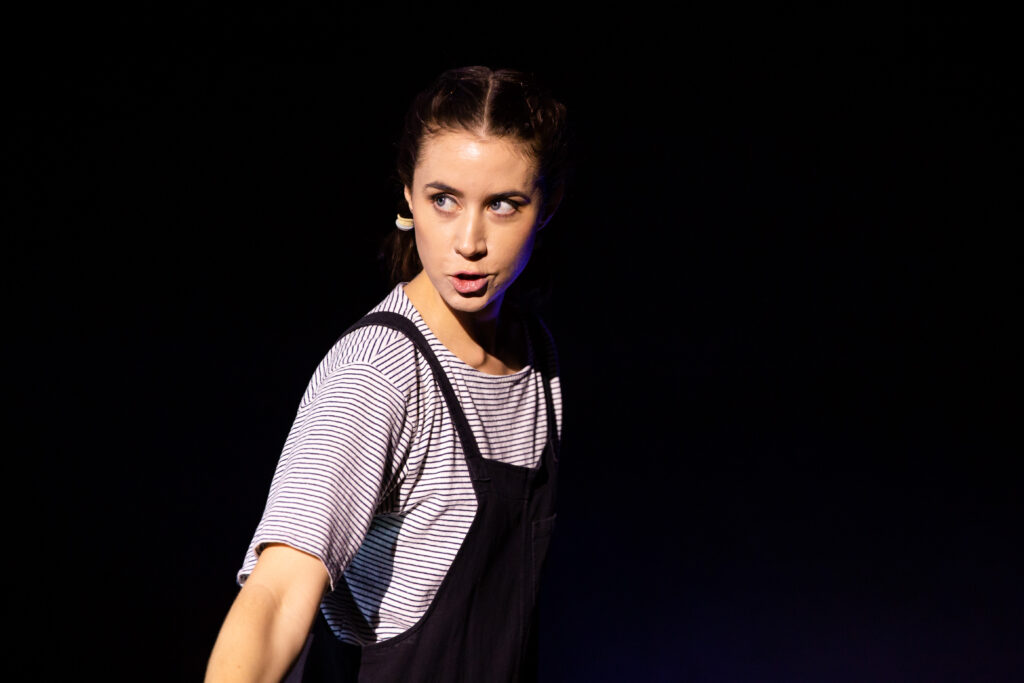Now playing: Liz Kingsman’s One Woman Show
If you’re over a certain age and a regular theater-goer, you’ve probably seen your fair share of one woman shows. But you’ve never seen one like Liz Kingsman’s.
In my previous life as a theater scholar I was so intrigued by what made a solo performance compelling and engaging that I wrote a PhD on it! This phenomenon — a person telling or enacting a story in real time for a live audience — is arguably as old as humanity. Cavedwellers in front of a campfire must’ve stood up and said, ‘Well, let me tell you about this mammoth I encountered today’…
The need for self-expression — telling each other what has happened to us and how we survived — is entertainment, but it also points to the unarticulated contract between the individual and their tribe.
From the ancient Greeks to Charles Dickens and Edgar Allen Poe, folks — mostly men — have drawn audiences to their tales. In the United States in the late 20th Century the form became a theatrical branch of civil rights movements, especially feminism and gay rights. The form was also beloved by artists and writers who felt they were at odds with the dominant discourse and through spoken word, music, movement, and monologue poked fun at stereotypes and sacred cows in a way that was more nuanced than standup comedy: think Karen Finley, Holly Hughes, Spalding Gray, Laurie Anderson to name just a few. At one point in the 1990s it seemed everybody was doing a one-person show, until the form faded in the early 2000s.
But far from being lectured, the one woman show could also be box office: Lily Tomlin’s Broadway hit The Search for Signs of Intelligent Life in the Universe in 1985 set a precedent for noteworthy women’s performance as something to see. Anna Deavere Smith’s Fires in the Mirror in 1992 is another such example, as is more recently Heidi Schreck’s What the Constitution Means to Me, in 2019. The #MeToo movement has proved fuel for stories about what happens to women, as the renegotiation of the contract between the state and women’s bodies (endemic sexual assault, the repeal of Roe v. Wade, trans women’s rights etc.) cannot be ignored.
Most recently, the solo form seems to have found favor with the Brits, such as Jade Anouka’s Heart last year, a coming out tale of a woman of color, and this year’s Prima Facie, written by Australian Suzie Miller and starring British actor Jodie Comer in a Tony-winning solo performance about sexual assault. Anyone who’s seen that show knows it is an immensely physical and verbal feat to pull off, the harrowing subject matter ripped from the zeitgeist around sexual justice.
Now, if you’re a Brit, your holy grail in this genre is Phoebe Waller-Bridge’s 2019 acclaimed monologue, Fleabag. And a generation of young women across the Pond have taken note. Now playing Off-Broadway is the lesser-well-known Liz Kingsman in the generically-titled One Woman Show. That gives you a clue, perhaps, as to her objective. Unlike other works in this vein, Kingsman’s sold-out West End hit is meta, irreverent, outlandish, hilarious, and strangely cathartic.



Photos: Joan Marcus
One Woman Show doesn’t mock women’s sexual freedom, or mental health, or marginal identity, or any other topics that may be given special insight through solo performance. It’s more that Kingsman makes fun of the sacred cow status of abject selfhood and puts a pin in the balloon of the messed-up young femme trope; women, she seems to suggest, have been sold the idea that their level of damage is the equivalent of their worth.
Now, this is not a show about sexual assault or victim shaming or even a show about a white person of privilege elbowing their way into the oppression Olympics. It’s a satirical skewering of the content machine’s rush to tell “women’s stories” in a way that is disingenuous and still tethers them to patriarchal narratives.
Kingsman’s show is a play-within-a-play about a desperate actor-writer who longs for Fleabag-type fame and so devises a show called Wildfowl — about (ridiculously) a young woman who works for a bird conservation nonprofit and has obsessive and delusional relationships with men because… she thinks she is supposed to? This part for me was the hardest to digest: the continued pursuit of alcohol and meaningless/meaningful sex by chaotic young women (some things never change, even after three waves of feminism). But what makes One Woman Show satisfying is its parody of this female protagonist, who content creators would have us believe is archetypal rather than what it is: a stereotype.
Kingsman blows apart this stereotype while inhabiting it convincingly — and also plays her female supporting characters including her consoling best friend/roommate, and her sermonizing and surveillant Australian boss Dana, with wit and agility.
It’s hard to write about this show without giving its pleasures and surprises away, but one of the many laugh-out-loud moments comes when Kingsman, who remains costumed throughout the packed performance in her manic pixie plaits and overalls, announces she is going to strip down and bare all (a timeworn solo performance trope) — only to shed one costume and reveal an exact replica underneath.
One Woman Show is on at Greenwich House Theater for a limited engagement through Friday, August 11. Get tickets here.






